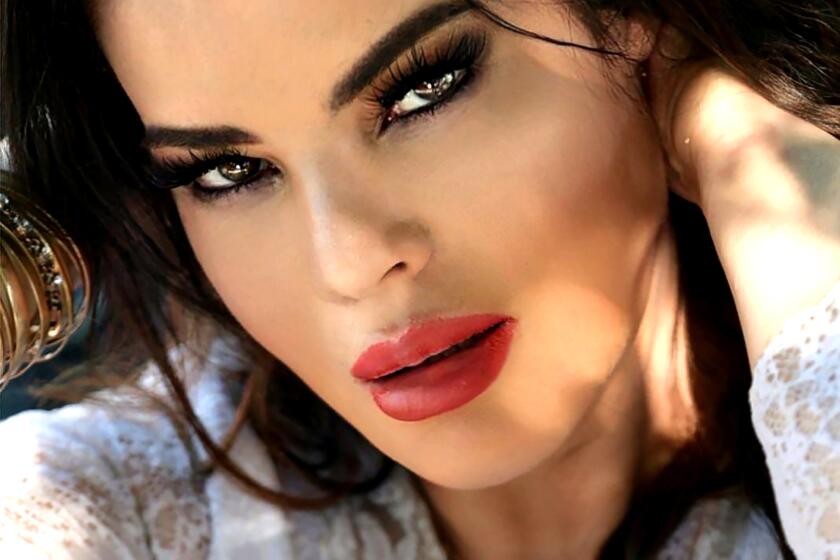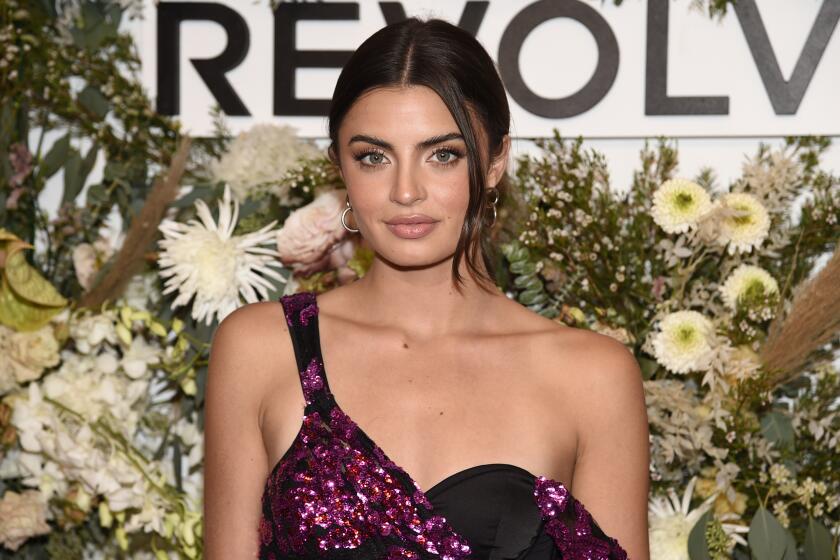The three comedy names that broke ground in 2018: Hannah Gadsby, Drew Michael and Donald Trump
- Share via
In 2018, there were three names that seemingly everyone in or around comedy had an opinion about: Hannah Gadsby, Drew Michael and Donald Trump.
The president functioning as a key topic in comedy is far from new — in fact, a case could be made that our reality TV-forged president wouldn’t have it any other way. Trump has a long history of being ready with a Twitter response to mockery regardless of the outside demands of issues foreign and domestic in his job. “Can’t be legal?” he wondered after the final episode of “Saturday Night Live” of 2018 targeted him again, continuing a presidential track record of answering and amplifying criticism of his actions.
Though social media trolls ready to respond with violent threats unfortunately raised the stakes for entertainers who found themselves targeted by the president, it also could constitute a sort of official confirmation of a joke reaching its target — for good and for bad as comics like Samantha Bee and Michelle Wolf weathered media-assisted critiques for going to far. Still, for some, the question surely became one of if a political joke falls on an audience and doesn’t generate an angry tweet, did it even happen at all?
And while there were many standout stand-up performances in 2018 — John Mulaney, Iliza Shlesinger, Cameron Esposito, W. Kamou Bell and, inexplicably, Adam Sandler — rarely have two performers raised as many questions about the form as Michael and Gadsby. Though Netflix’s deluge of stand-up releases from around the world at times felt like a digital reproduction of the first comedy boom that burst in the 1980s, both of these comics became topics of conversation by taking the open-ended, try-anything legacy of the format that is so lionized in award-winning shows like “The Marvelous Mrs. Maisel” at its word.
The first, and somehow most divisive, of these specials was “Nanette” by Gadsby. A 40-year-old, Tasmanian-born lesbian whose special was filmed at the Sydney Opera House, Gadsby begins in a familiar place with dryly delivered jokes about gender and her background before announcing that she’s quitting comedy, poking holes at the futility of its long-held history of self-depreciation on the way to indicting the form itself.
RELATED: What’s funny now? Three ways of looking at comedy’s shifting landscape
“I put myself down to seek permission to speak, and I simply will not do that anymore,” Gadsby says early in “Nanette,” before continuing through an artfully constructed set that builds to something furious, cathartic and unlike any other comedy performance.
“Nanette,” in tradition with the best of comedy, mines big emotions and personal trauma but on a path that isn’t always dedicated to pursuing a laugh. At a time where stand-up specials are as easy to discern as drops in a waterfall, it became appointment viewing. Still, its refusal to conform to setup-punchline norms left some comics wishing for it to be classified somewhere else. It’s a “TED Talk with chuckles,” veteran comic David Allen Grier told me during one interview, echoing a common critique that Gadsby herself endorsed as audiences responded to “Nanette’s” unconventional rhythms with more applause than stunned silences after the special aired.
Where Gadsby took audiences on an unconventional emotional journey, Michael dispensed with the audience entirely and, crucially, the laughter they (ideally) bring. A writer for “Saturday Night Live” who released his debut special on HBO last summer, Micheal laid bare much of the self-obsession that’s part of a comedian’s job description.
Directed by fellow stand-up Jerrod Carmichael, the self-titled special appears to exist in a dream-like psychological void. Shot at odd angles and often with only his head and shoulders in view, the 30-something Michael frequently appears to be floating in a nothingness that depicts him as something akin to a voice in your head.
RELATED - Best of 2018: A look back at the year in movies, TV, music and more
His performance is as animated as any onstage set, and with only silence and his occasional smirk punctuating his material, the confessional jokes about intimacy, relationships and his family felt simultaneously funny and uncomfortable as the facade of comedy as anything more than a line of defense is stripped bare. Without so much as a microphone to offer a barrier between him and his imagined audience, Michael’s risky special somehow felt more raw and vulnerable even as, onscreen, there was no crowd to win over.
In between, Michael appears in Skype exchanges with his girlfriend (played by Suki Waterhouse) that begin as playful flirtations but ultimately chronicle a relationship that arcs to a self-lacerating confrontation where Michael preemptively criticizes everything you’ve just seen.
“Get over yourself,” Waterhouse tells him, “You’ve constructed this whole elaborate way to never change — and they’re not even jokes, it’s just you talking about your problems. Where is the funny in this?”
But did “Drew Michael” qualify as stand-up comedy given there was no one to stand up before and no laughter to guide the performer or the viewer? The answer again proved divisive, and ultimately in the eye of the beholder, which meant that comedy still hadn’t changed much at all. But it’s encouraging that after this many years it can still become something unfamiliar.
ALSO
Kathy Griffin: Fearless and back on the road as she mounts a comeback
In the crosshairs of outrage: Roseanne, Kathy Griffin and now Kevin Hart. Comedy’s shifting red line
Michelle Wolf hits her targets at the White House correspondents’ dinner
How a political dinner made Michelle Wolf a household name
Follow me over here @chrisbarton.
ALSO:
More to Read
The complete guide to home viewing
Get Screen Gab for everything about the TV shows and streaming movies everyone’s talking about.
You may occasionally receive promotional content from the Los Angeles Times.







